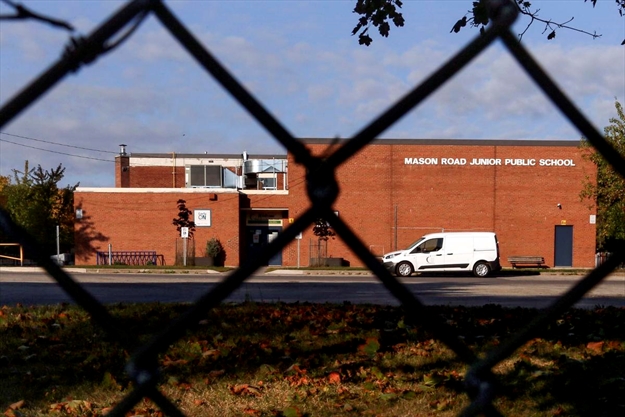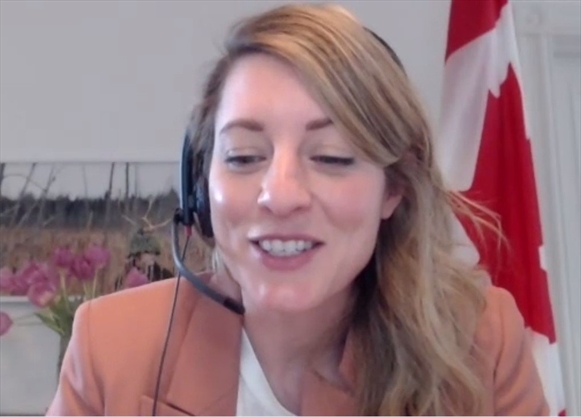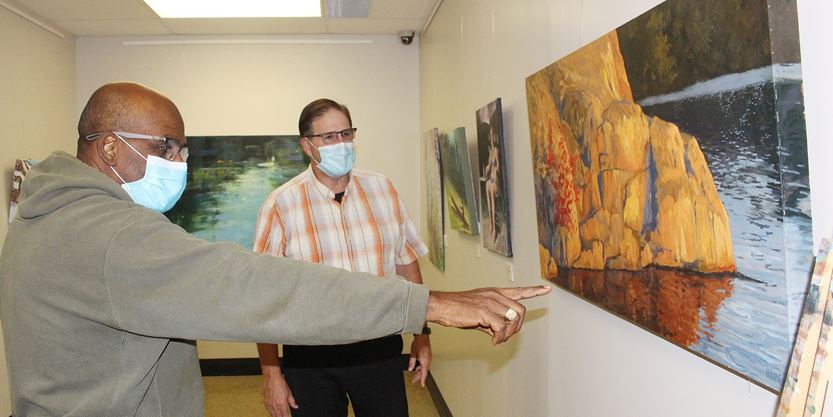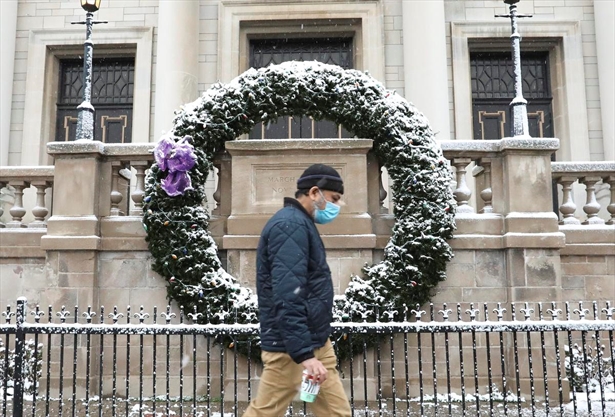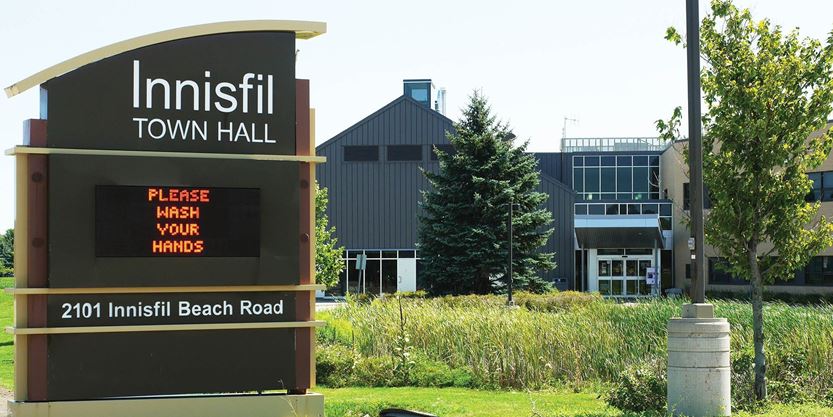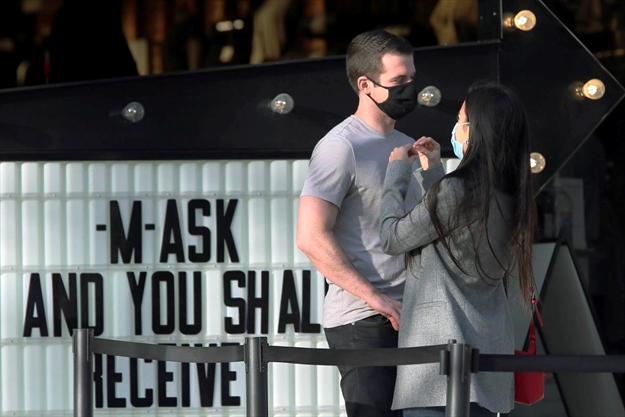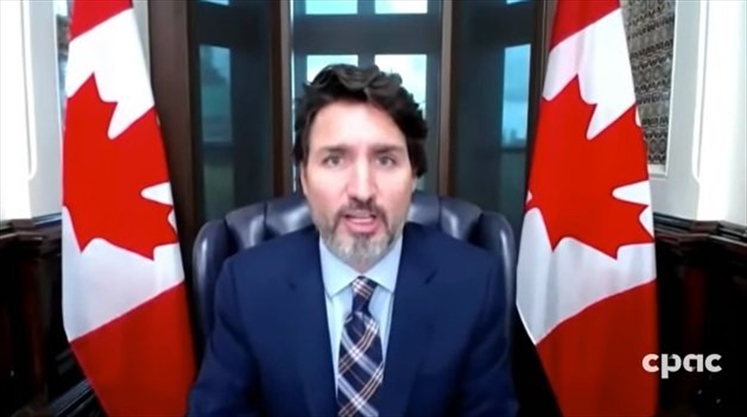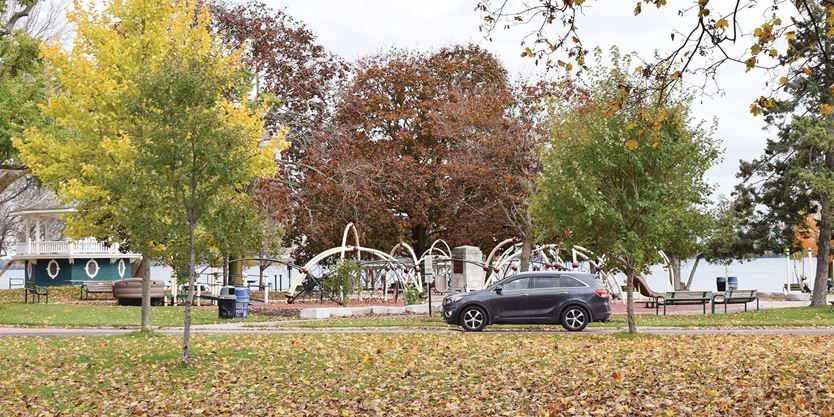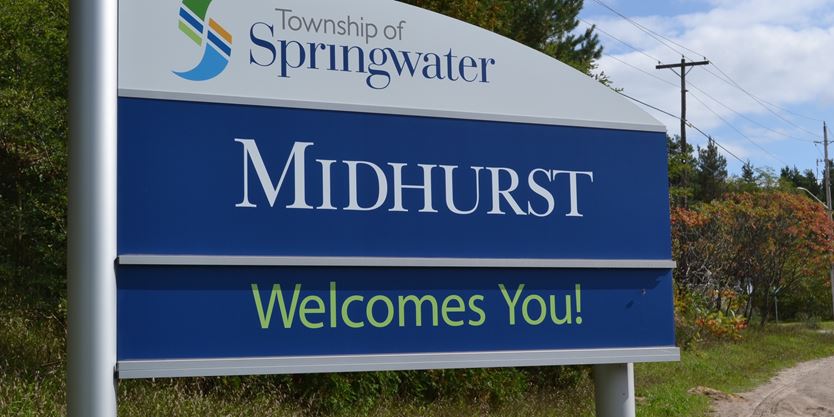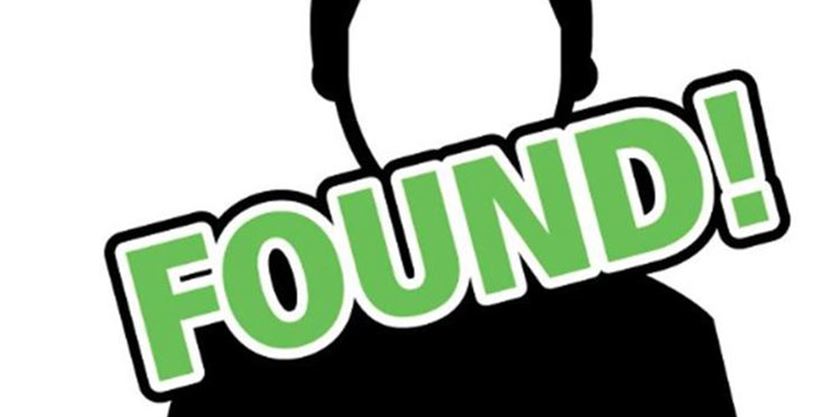The latest news from Canada and around the world Wednesday. This file will be updated throughout the day. Web links to longer stories if available.
12:06 a.m.: Nearly 100 world leaders and several dozen government ministers are scheduled to speak at the U.N. General Assembly’s special session that opens Thursday to discuss the response to COVID-19 and the best path to recovery from the pandemic, which has claimed 1.5 million lives and shattered economies in both rich and poor countries.
Assembly President Volkan Bozkir said when he took the reins of the 193-member world body in September that it would have been better to hold the high-level meeting in June. Nonetheless, he said Wednesday that the session “provides a historic moment for us to come together to beat COVID-19.”

“With news of multiple vaccines on the cusp of approval, and with trillions of dollars flowing into global recovery efforts, the international community has a unique opportunity to do this right,” he said. “The world is looking to the U.N. for leadership. This is a test for multilateralism.”
12:05 a.m.: Grade 7-12 students will temporarily move to remote learning in the new year, as part of Winnipeg’s plan to ensure COVID-19 cases don’t spike after the holidays — should people defy public health advice and get together.
Starting Jan. 4, following the scheduled winter break, the province’s oldest learners will study at home.
That option will also be available to kindergarten to Grade 6 students — at their parent’s discretion — for the two-week period that runs until Jan. 15.
Education Minister Kelvin Goertzen and Dana Rudy, deputy minister, announced what they call a preventative measure on Wednesday.
Goertzen said the decision to create a buffer period after the break takes into consideration the transition planning time required and public health advice, given the province has recorded an uptick in COVID-19 cases after holidays, including Thanksgiving.
“(Public health officials) support this plan. They think it’s both prudent and balanced in terms of ensuring that students, by and large, have the availability of in-class learning, except for a brief disruption, primarily for those in the older age groups,” he told reporters.
During that period, classroom instruction will be available for the youngest students, as well as for any Grade 7 to 12 student who has special needs that require accommodation at school.
Rudy said the province wants to ensure classroom continuity for students, while Goertzen emphasized the arrangement is temporary.
The province chose Grade 7 as a benchmark because 12-year-olds can typically work independently.
Older students tend to have a larger number of close contacts because they might work in the community, they experienced an easier transition to remote learning in the spring, and research shows they are both more likely to contract the virus and transmit it to others, said Manitoba Education.
James Bedford, president of the Manitoba Teachers’ Society, said he felt “extraordinary disappointment” after the announcement.
All teachers will spend their much-needed holidays planning while K-6 educators want to know why their schools will be safe after the break if high schools won’t be, Bedford said.
11:08 p.m.: The Manitoba Teachers’ Society wants a universal mask mandate in schools, citing months of practice wearing masks during the COVID-19 pandemic and growing concerns about asymptomatic carriers in classrooms.
“A child in Grade 3 isn’t required to wear a face mask when they’re attending class with 20 or potentially 24 or more other students, but when that child accompanies a parent to a trip to, say, the drugstore, a face mask is required,” said James Bedford, president of the Manitoba Teachers’ Society.
“If it’s mandated in the drugstore, mandate it in the classroom.”
Before the school year got underway, chief provincial public health officer Dr. Brent Roussin issued a “strong recommendation” to K-12 students to don face coverings at school.
Following public backlash and pressure from parents, educators and the Manitoba Teachers’ Society in August, the province deemed non-medical masks mandatory for students in Grade 4 and up.
Face coverings were also mandated in situations when two metres of physical distancing is not possible, in Grade 3-4 split classes and on the school bus for all ages. Students are eligible for mask exemptions if unable to remove a mask without assistance, among other criteria.
10:44 p.m.: Rockin’ around the Christmas tree looks different for visitors at Rockefeller Center this year, starting with Wednesday’s tree lighting ceremony.
What’s normally a chaotic, crowded tourist hotspot during the holiday season was instead a mask-mandated, time-limited, socially distanced locale due to the coronavirus pandemic.
The tree, a 23-meter Norway spruce, had its holiday lights turned on in an event that was broadcast on television but closed to the public. The telecast used pre-recorded performances from entertainers like Kelly Clarkson and Dolly Parton, and camera shots of the streets around the tree showed them to be largely empty.
10:34 p.m.: Shares were mostly higher in Asia on Thursday, helped by progress toward rolling out coronavirus vaccines and talk of reaching a compromise on new help for the U.S. economy.
Shares rose in Hong Kong, Tokyo, Seoul and Sydney but fell in Shanghai.
The rollout of a vaccine in the U.S. could begin this month, if regulators give their approval. Drugmakers Pfizer and BioNTech said they won permission for emergency use of their COVID-19 vaccine in Britain, which will be one of the first countries to begin vaccinating its population against the virus.
The vaccine is the world’s first coronavirus shot that’s backed by rigorous science and a major step toward eventually ending the pandemic and helping economies return to normal.
10 p.m.: In Alberta, a COVID-19 vaccine can’t arrive soon enough.
With coronavirus cases rising at an alarming rate — and a Red Cross field hospital being explored as an option — provincial officials told a news conference Wednesday the day that doses will become available is “almost here.”
While people around the world no doubt share in the anticipation for a vaccine, especially in light of news that Britain has approved the very first fully tested one, the need for doses in Canada may soon be uniquely dire in the western Prairie province.
9:35 p.m.: At least a handful of religious leaders across Western Canada are pushing back against provincial lockdowns and COVID-19 restrictions, saying the spiritual and communal needs of churchgoers are being given short shrift.
Arguing that the ability to attend church should be considered just as “essential” as going to the grocery store, some churches in recent weeks have held gatherings in open defiance of provincial rules.
It appears some cases could be headed to court.
9:32 p.m.: Hundreds of thousands of masked students in South Korea, including 35 confirmed COVID-19 patients, took the highly competitive university entrance exam Thursday despite a viral resurgence that forced authorities to toughen social distancing rules.
The Education Ministry said about 493,430 students were taking the one-day exam at about 1,380 sites across the nation. They include hospitals and other medical facilities with the 35 virus patients and hundreds of others placed under self-quarantine.
8:26 p.m.: Yukon health officials say they’re investigating a new COVID-19 case in Whitehorse.
Chief medical officer Dr. Brendan Hanley confirmed the new case today, bringing the territory’s total to 50.
There are currently 20 active cases in Yukon.
The territory says in a news release that cases 48 and 49 have been linked to a previous case.
8:24 p.m.: Canada is drawing closer to making a decision on a leading COVID-19 vaccine candidate, Health Minister Patty Hajdu said Wednesday as the federal government continued to face pressure to deliver on doses amid mounting cases and deaths.
In a series of Twitter messages, Hajdu described the United Kingdom’s decision to authorize the vaccine made by Pfizer and its German partner BioNTech as “encouraging.”
7:41 p.m.: The latest numbers of confirmed COVID-19 cases in Canada as of 7:30 p.m. ET on Wednesday, Dec. 2, 2020.
There are 389,775 confirmed cases in Canada.
- Canada: 389,775 confirmed cases (67,564 active, 309,886 resolved, 12,325 deaths).The total case count includes 13 confirmed cases among repatriated travellers.
There were 6,307 new cases Wednesday from 79,492 completed tests, for a positivity rate of 7.9 per cent. Over the past seven days, there have been a total of 42,309 new cases. The seven-day rolling average of new cases is 6,044.
There were 114 new reported deaths Wednesday. Over the past seven days there have been a total of 615 new reported deaths. The seven-day rolling average of new reported deaths is 88. The seven-day rolling average of the death rate is 0.23 per 100,000 people. The overall death rate is 32.79 per 100,000 people.
There have been 11,652,814 tests completed.
- Newfoundland and Labrador: 340 confirmed cases (30 active, 306 resolved, four deaths).
There was one new case Wednesday from 319 completed tests, for a positivity rate of 0.31 per cent. Over the past seven days, there has been 16 new case. The seven-day rolling average of new cases is two.
There have been no deaths reported over the past week. The overall death rate is 0.77 per 100,000 people.
There have been 63,163 tests completed.
- Prince Edward Island: 72 confirmed cases (four active, 68 resolved, zero deaths).
There were zero new cases Wednesday from 354 completed tests, for a positivity rate of 0.0 per cent. Over the past seven days, there have been a total of two new cases. The seven-day rolling average of new cases is zero.
There have been no deaths reported over the past week. The overall death rate is zero per 100,000 people.
There have been 61,037 tests completed.
- Nova Scotia: 1,332 confirmed cases (127 active, 1,140 resolved, 65 deaths).
There were 17 new cases Wednesday from 2,340 completed tests, for a positivity rate of 0.73 per cent. Over the past seven days, there have been a total of 89 new cases. The seven-day rolling average of new cases is 13.
There have been no deaths reported over the past week. The overall death rate is 6.69 per 100,000 people.
There have been 149,259 tests completed.
- New Brunswick: 514 confirmed cases (119 active, 388 resolved, seven deaths).
There were six new cases Wednesday from 1,062 completed tests, for a positivity rate of 0.56 per cent. Over the past seven days, there have been a total of 61 new cases. The seven-day rolling average of new cases is nine.
There have been no deaths reported over the past week. The overall death rate is 0.9 per 100,000 people.
There have been 102,612 tests completed.
- Quebec: 145,062 confirmed cases (12,740 active, 125,197 resolved, 7,125 deaths).
There were 1,514 new cases Wednesday from 9,764 completed tests, for a positivity rate of 16 per cent. Over the past seven days, there have been a total of 9,632 new cases. The seven-day rolling average of new cases is 1,376.
There were 41 new reported deaths Wednesday. Over the past seven days there have been a total of 210 new reported deaths. The seven-day rolling average of new reported deaths is 30. The seven-day rolling average of the death rate is 0.35 per 100,000 people. The overall death rate is 83.97 per 100,000 people.
There have been 2,204,216 tests completed.
- Ontario: 119,922 confirmed cases (14,526 active, 101,698 resolved, 3,698 deaths).
There were 1,723 new cases Wednesday from 42,779 completed tests, for a positivity rate of 4.0 per cent. Over the past seven days, there have been a total of 12,039 new cases. The seven-day rolling average of new cases is 1,720.
There were 35 new reported deaths Wednesday. Over the past seven days there have been a total of 144 new reported deaths. The seven-day rolling average of new reported deaths is 21. The seven-day rolling average of the death rate is 0.14 per 100,000 people. The overall death rate is 25.39 per 100,000 people.
There have been 6,146,013 tests completed.
- Manitoba: 17,384 confirmed cases (8,970 active, 8,072 resolved, 342 deaths).
There were 277 new cases Wednesday from 2,336 completed tests, for a positivity rate of 12 per cent. Over the past seven days, there have been a total of 2,477 new cases. The seven-day rolling average of new cases is 354.
There were 14 new reported deaths Wednesday. Over the past seven days there have been a total of 86 new reported deaths. The seven-day rolling average of new reported deaths is 12. The seven-day rolling average of the death rate is 0.9 per 100,000 people. The overall death rate is 24.97 per 100,000 people.
There have been 351,645 tests completed.
- Saskatchewan: 8,982 confirmed cases (3,970 active, 4,959 resolved, 53 deaths).
There were 237 new cases Wednesday from 1,342 completed tests, for a positivity rate of 18 per cent. Over the past seven days, there have been a total of 1,935 new cases. The seven-day rolling average of new cases is 276.
There were two new reported deaths Wednesday. Over the past seven days there have been a total of 16 new reported deaths. The seven-day rolling average of new reported deaths is two. The seven-day rolling average of the death rate is 0.19 per 100,000 people. The overall death rate is 4.51 per 100,000 people.
There have been 263,604 tests completed.
- Alberta: 61,169 confirmed cases (17,144 active, 43,464 resolved, 561 deaths).
There were 1,685 new cases Wednesday from 13,989 completed tests, for a positivity rate of 12 per cent. Over the past seven days, there have been a total of 10,368 new cases. The seven-day rolling average of new cases is 1,481.
There were 10 new reported deaths Wednesday. Over the past seven days there have been a total of 61 new reported deaths. The seven-day rolling average of new reported deaths is nine. The seven-day rolling average of the death rate is 0.2 per 100,000 people. The overall death rate is 12.83 per 100,000 people.
There have been 1,487,573 tests completed.
- British Columbia: 34,728 confirmed cases (9,835 active, 24,424 resolved, 469 deaths).
There were 834 new cases Wednesday from 5,062 completed tests, for a positivity rate of 16 per cent. Over the past seven days, there have been a total of 5,642 new cases. The seven-day rolling average of new cases is 806.
There were 12 new reported deaths Wednesday. Over the past seven days there have been a total of 98 new reported deaths. The seven-day rolling average of new reported deaths is 14. The seven-day rolling average of the death rate is 0.28 per 100,000 people. The overall death rate is 9.25 per 100,000 people.
There have been 807,438 tests completed.
- Yukon: 49 confirmed cases (19 active, 29 resolved, one deaths).
There were two new cases Wednesday from 63 completed tests, for a positivity rate of 3.2 per cent. Over the past seven days, there have been a total of 10 new cases. The seven-day rolling average of new cases is one.
There have been no deaths reported over the past week. The overall death rate is 2.45 per 100,000 people.
There have been 5,399 tests completed.
- Northwest Territories: 15 confirmed cases (zero active, 15 resolved, zero deaths).
There were zero new cases Wednesday from 37 completed tests, for a positivity rate of 0.0 per cent. Over the past seven days, there have been a total of zero new cases. The seven-day rolling average of new cases is zero.
There have been no deaths reported over the past week. The overall death rate is zero per 100,000 people.
There have been 6,434 tests completed.
- Nunavut: 193 confirmed cases (80 active, 113 resolved, zero deaths).
There were 11 new cases Wednesday from 45 completed tests, for a positivity rate of 24 per cent. Over the past seven days, there have been a total of 38 new cases. The seven-day rolling average of new cases is five.
There have been no deaths reported over the past week. The overall death rate is zero per 100,000 people.
There have been 4,345 tests completed.
7:29 p.m.: The international police agency Interpol has issued a global alert, warning police and consumers to beware of organized crime groups selling bogus COVID-19 vaccines.
“As governments are preparing to roll out vaccines, criminal organizations are planning to infiltrate or disrupt supply chains.” Jürgen Stock, Interpol Secretary General, said in a prepared statement that accompanied the alert.
Interpol is an inter-governmental organization of 194 countries, including Canada, which coordinates information on shared threats.
7:15 p.m.: U.S. hospitals slammed with COVID-19 patients are trying to lure nurses and doctors out of retirement, recruiting students and new graduates who have yet to earn their licenses and offering eye-popping salaries in a desperate bid to ease staffing shortages.
With the virus surging from coast to coast, the number of patients in the hospital with the virus has more than doubled over the past month to a record high of nearly 100,000, pushing medical centres and health care workers to the breaking point. Nurses are increasingly burned out and getting sick on the job, and the stress on the nation’s medical system prompted a dire warning from the head of the Centers for Disease Control and Prevention.
“The reality is December and January and February are going to be rough times. I actually believe they are going to be the most difficult time in the public health history of this nation,” Dr. Robert Redfield said.
Read the full story by Grant Schulte And Amy Forliti:
6:41 p.m.: In Manitoba, the Southern Chiefs’ Organization (SCO) is making an urgent appeal to the province’s Justice Minister Cliff Cullen to address concerns about the increase of COVID-19 infections in Manitoba’s correctional facilities.
SCO Grand Chief Jerry Daniels said in a press release issued on Wednesday that he sent a letter to the minister on November 20 expressing his concerns.
“We need to know that our people are being cared for given how difficult the logistics are when it comes to managing a COVID-19 outbreak in these facilities,” said Daniels.
In the letter, Daniels requested a response within the week, which would have been Nov. 27. However, even after following up, they have yet to hear a response from the minister or any provincial government staff.
As of Nov. 30, 249 people have tested positive for COVID-19 at the Headingley Correctional Centre. 30 cases were found at the Women’s Correctional Centre, and 18 were found at the Agassiz Youth Centre, with 13 of them being youths.
The organization believes that the cause of the rise of COVID-19 cases in correctional centres is due to the facilities being overcrowded as well as First Nations people’s underlying health conditions.
Read the full story by Nicole Wong:
6:29 p.m.: Alberta is reporting 1,685 new cases of COVID-19.
It also says there have been 10 additional deaths.
There are 504 people in hospital and 97 of those are in intensive care.
Premier Jason Kenney says he has appointed a group to plan the rollout of a COVID-19 vaccine expected to arrive in the new year.
6:18 p.m.: Another dozen people have died in British Columbia after they became ill with COVID-19.
Provincial health officer Dr. Bonnie Henry says that has brought the death toll since the start of the pandemic in B.C. to 469 people.
There were another 834 new cases for a total of 34,728 infections.
Two more hospitals have outbreaks, at Saanich and West Coast General Hospital in Port Alberni, joining 54 active outbreaks in long-term care or assisted living facilities in the province.
4:04 p.m.: The Manitoba government will require many students to stay home from school and learn remotely for two weeks after the holiday break.
Education Minister Kelvin Goertzen says the aim is to reduce the risk of spreading COVID-19 after students spend time with close contacts over the holidays.
From Jan. 4 to Jan. 15, students in Grades 7 to 12 will have to learn remotely, except for those with special needs.
Younger children, from kindergarten to Grade 6, will have the option of learning remotely or going to school.
Manitoba is reporting 277 new COVID-19 cases and 14 deaths.
Chief public health officer, Dr. Brent Roussin, says the daily case count has dropped in recent days but the health-care system is still being strained.
3:39 p.m.: Canada’s chief public health officer says the priority list of people who will get vaccinated first against COVID-19 has to be refined because the initial six million doses won’t be enough to cover them all. Dr. Theresa Tam is also worried about the impact anti-vaccination rhetoric will have on Canada’s vaccination effort which is critical to ending the COVID-19 pandemic nightmare.
Tam told medical professionals at the 2020 Canadian Immunization Conference today that Canadians can expect larger numbers of doses to arrive in the spring after more vaccines are approved and production has been scaled up.
But she says the six million doses set to arrive between January and March will not be enough to vaccinate everyone on the initial priority list developed by the National Advisory Committee on Immunization.
Tam says that list, which includes people most at risk of serious illness or death and those most at risk of being exposed, is currently being refined.
She also addressed growing evidence of anti-vaccine rhetoric, appealing to experts in the medical field to use credible evidence to help influence Canadians to trust that a vaccine won’t be approved if it is not safe.
3:17 p.m.: Health Canada says a review of a COVID-19 vaccine approved for emergency use in the United Kingdom is expected to be completed soon.
British officials gave the go-ahead for a vaccine developed by American drugmaker Pfizer and Germany’s BioNTech today.
Health Canada says its independent review of the vaccine is ongoing. It says the review started Oct. 3.
Canada has a purchase deal to buy at least 20 million doses from Pfizer and the option to buy another 56 million.
The first four million are supposed to arrive between January and March.
2:45 p.m.: Saskatchewan is reporting 238 new cases of COVID-19 and two more dead.
Health officials say those who died were 60 and older and their deaths bring the province’s death toll since the start of the pandemic to 53.
There are 132 people in hospital, with 26 people receiving intensive care.
Saskatchewan’s seven-day average of new daily cases sits at 274.
Premier Scott Moe says although he expects high case numbers for weeks to come, he hopes community transmission rates will be lowered enough to loosen household gathering restrictions in time for Christmas.
2:21 p.m.: Public health officials in New Brunswick are reporting six new cases of COVID-19 in the province Wednesday.
The Moncton, Saint John, Fredericton and Edmundston regions each had one case, while there were two in the Bathurst region.
There are now 119 active cases in the province.
There has been a total of 514 cases and seven deaths since the pandemic began.
1:45 p.m.: Refugee advocates to resume deportations before the country irons out the details of a program to grant permanent residency to asylum-seekers who have been working in the health-care system during the COVID-19 pandemic.
Frantz Andre, who advocates on behalf of asylum seekers, says the decision has heightened the feelings of insecurity among the essential workers dubbed “guardian angels” by Quebec Premier Francois Legault.
1:43 p.m.: Manitoba is reporting 277 new COVID-19 cases and 14 deaths.
Chief public health officer Dr. Brent Roussin says the daily case count has dropped in recent days, but the health-care system is still being strained.
Almost half of the 106 intensive care beds being used in the province are occupied by people with COVID-19.
1:36 p.m.: Nova Scotia is reporting 17 new cases of COVID-19, bringing its total of active cases to 127.
Sixteen are in the Halifax area, including a case at St. Margaret’s Bay Elementary school that was reported late Tuesday.
Health officials say the remaining case reported today is in the northern health zone and is related to travel outside of Atlantic Canada.
Nova Scotia Health Authority labs completed 3,295 tests on Tuesday.
1 p.m.: Sunnybrook hospital has announced it’s now offering virtual same-day emergency department appointments, for anyone with an urgent but non-life-threatening condition.
The 15-minute sessions will be held over a secure Zoom call with one of their ER doctors, and can be booked by anyone over the age of 16. Appointment bookings will start at 12 p.m. from Monday to Friday and end at 8 p.m. or until all appointments are taken.
The sessions themselves will run on a first-come-first-served basis, from 2 p.m. to 9 p.m. on weekdays.
Sunnybrook urges patients to consult their family doctors before booking a timeslot. You can book an appointment .
12:55 p.m. Quebec is reporting a record number of new daily COVID-19 cases, with 1,514 infections added Wednesday.
The Health Department also reported 43 new deaths linked to the novel coronavirus, including nine in the past 24 hours.
The province’s previous high for daily cases was reported Saturday, when the province hit 1,480 new cases.
Hospitalizations have increased by 21 for a total of 740, with one more patient in intensive care for a total of 99.
12:54 p.m. There is one new case of COVID-19 in Newfoundland and Labrador.
Health officials say the new case is related to travel and involves a man between 20 and 39 years old in the eastern part of the province.
There have been 340 confirmed cases of COVID-19 in Newfoundland and Labrador since the onset of the pandemic.
12:25 p.m.: Russian President Vladimir Putin on Wednesday ordered the start of a “large-scale” COVID-19 vaccination by late next week, with doctors and teachers to be the first in line to receive the Sputnik V shots, which have yet to complete advanced studies needed to ensure its effectiveness and safety in line with established scientific protocols.
Putin’s statement comes hours after Britain became the first country in the West to authorize the use of a COVID-19 vaccine from U.S. drugmaker Pfizer and Germany’s BioNTech.
Sputnik V has been touted in Russia as the world’s “first registered COVID-19 vaccine” after it received regulatory approval in early August. However, giving the shots the government go-ahead drew considerable criticism from experts, because at the time they had only been tested on several dozen people.
12 p.m.: The Ontario government has sent two dozen contact tracers to Windsor, Ont., as public health officials there grapple with numerous COVID-19 outbreaks and warn the region is on the verge of entering lockdown.
Dr. Wajid Ahmed, the medical officer of health for Windsor-Essex, says the region is sending daily updates to the province on the state of 17 active outbreaks.
The region entered the red level of the province’s tiered, colour-coded pandemic response framework on Monday.
Two weeks earlier, it had entered the yellow level, before advancing to orange.
Ahmed says the impact on schools is of particular concern, with two elementary schools currently closed due to outbreaks.
At one school, 29 students and nine staff tested positive for the virus.
Ahmed says school outbreaks are a symptom of community spread, so if the region can’t control the virus, more schools could be forced to close.
He says the region’s proximity to the U.S.-Canada border is also an issue.
The Windsor-Essex Public Health unit recorded 41 new cases of COVID-19 today, along with two new deaths.
The province as a whole, meanwhile, is reporting 1,723 new cases of COVID-19 today, and 35 new deaths due to the virus.
12 p.m.: In Ontario’s long-term care homes, 664 residents currently have COVID-19 and 22 new deaths have been reported today.
The province says 111 of its 626 long-term care homes are experiencing an outbreak.
11:10 a.m.: Quebec is reporting a record number of new daily COVID-19 cases, with 1,514 infections added today.
The Health Department also reported 43 new deaths linked to the novel coronavirus, including nine in the past 24 hours.
The province’s previous high for daily cases was reported Saturday, when the province hit 1,480 new cases.
Hospitalizations have increased by 21 for a total of 740, with one more patient in intensive care for a total of 99.
11:05 a.m.: Ontario is reporting an additional 166 cases in public schools across the province, bringing the total in the last two weeks to 1,386 and 5,024 overall since school began.
, the province reported 140 more students were infected for a total of 1,144 in the last two weeks; since school began there have been an overall total of 3,234.
The data shows there are 26 more staff members infected for a total of 241 the last two weeks — and an overall total of 702.
There are 742 schools with a reported case, which is 15.37 per cent of the 4,828 public schools in Ontario.
Six schools were closed because of an outbreak. The data doesn’t indicate where they are.
There is a lag between the daily provincial data at 10:30 a.m. and news reports about infections in schools. The provincial data on Wednesday is current as of 2 p.m. Tuesday. It doesn’t indicate where the place of transmission occurred.
The Toronto District School Board updates its information on current COVID-19 cases throughout . As of 5 p.m. on Tuesday, there were 368 students infected, 70 staff and 440 resolved cases.
The Toronto Catholic District School Board also updates its information . As of 10:45 a.m. Wednesday, there were 68 schools with at least one active case. There are 117 active student cases and 24 staff.
Epidemiologists that the rising numbers in the schools aren’t a surprise, and that the cases will be proportionate to the amount of COVID that is in the community.
11 a.m.: Quebec public health authorities are introducing new rules for shoppers in malls and other stores during the busy holiday season amid growing COVID-19 concerns.
Deputy premier Genevieve Guilbault made the announcement today in Quebec City, saying businesses will have to enforce strict limits on the number of people allowed inside beginning Friday.
She says the maximum capacity will be set depending on the store’s total surface area, and that number must be clearly posted.
Distancing and the wearing of masks must also be enforced for clients waiting in line, and Guilbault says those not respecting the rules could be subject to fines of between $1,000 and $6,000.
Enforcement will fall to mall owners and store owners, she said.
On Tuesday, Premier Francois Legault said the province’s plan to allow for two gatherings during a four-day window around Christmas could be in peril as the number of hospitalizations in the province reached its highest point since June and new infections remained high.
10:49 a.m. A coalition of about 50 retailers is .
In an open letter to Premier Doug Ford and Health Minister Christine Elliott, the retailers argue that shutting down Toronto and Peel Region to restrict the virus’s spread hasn’t reduced the number of shoppers.
Instead, consumers are funnelled into fewer, crowded stores and adjacent communities, which potentially creates greater health risk.
The retailers say the current policy pushes more consumers to big-box and discount stores that remain open after being deemed essential, while thousands of small, independent and local stores are closed despite selling many of the same products.
They say they have been forced to lay off workers instead of employing thousands of temporary people to handle the holiday sales rush.
The business leaders are calling on the government to immediately open all retail stores in the province and impose a 25 per cent capacity limit on non-essential stores in lockdown regions.
“Large and small retailers need each other to create a vibrant retail ecosystem,” said the letter signed by the heads of companies including Hudson’s Bay, Canadian Tire, Birks and Ikea.
“Collectively, we are asking that you join with us in common cause and a shared commitment to keeping Ontario families safe and secure through this extraordinarily challenging period.”
The provincial government responded by noting the restrictions are aimed at limiting the spread of COVID-19 to protect the health and well-being of Ontarians.
10:35 a.m. Stocks fell in morning trading as investors eased off a fresh set of record highs reached on optimism that coronavirus vaccines could soon start driving a stronger economic recovery.
The S&P 500 slipped 0.2 per cent just a day after opening December with a bang. It closed at a record high of 3,662.45 on Tuesday.
The Nasdaq composite, which also opened the month with a new record, shed 0.5 per cent. The Dow Jones Industrial Average fell 73 points, or 0.3 per cent, to 29750 as of 10:15 a.m. Eastern time.
Technology companies were the biggest drag on the market. Salesforce.com sunk 8.6 per cent after announcing a deal late Tuesday to buy messaging platform Slack for $27.7 billion. Microsoft fell 1.1 per cent . The sector has been leading the market higher since the pandemic started wreaking havoc on the global economy, but hopes for a vaccine and return to economic normalcy have been shifting money toward companies whose profits are more closely tied to the economy’s strength.
10:33 a.m. Quebec’s deputy premier says that beginning Friday, stores and malls will have to enforce strict limits on the number of people allowed inside if they want to remain open.
Genevieve Guilbault says maximum capacity will be set according to a store’s total surface area, and the allowable number of customers will be clearly posted.
Distancing and mask-wearing must also be enforced for customers waiting in line, and Guilbault says those not respecting the rules could be subject to fines of between $1,000 and $6,000.
Guilbault says the situation remains fragile in Quebec, hinting that COVID-19 numbers to be released later this morning will show that.
10:08 a.m. (will be updated) Ontario is reporting 1,723 new cases of COVID-19 Wednesday and 35 new deaths due to the virus.
Health Minister Christine Elliott says there are 500 new cases in Peel Region, 410 cases in Toronto, and 196 cases in York Region.
The province says it has conducted 44,226 tests since the last daily report.
In total, 656 people are hospitalized in Ontario due to COVID-19, including 183 in intensive care.
The province is also reporting that 106 people are on ventilators in hospital.
9:30 a.m. Three promising COVID-19 vaccine candidates may have spurred optimism from investors, but Royal Bank of Canada’s chief executive is warning the country is not rid of its pandemic troubles yet.
Dave McKay told analysts Wednesday that the economy could still suffer some blows as the globe grapples with uncertainty around how soon people will be injected with Pfizer, Moderna and AstraZeneca’s vaccines.
“The economy has rebounded well to date,” he said on a call to discuss the bank’s fourth-quarter earnings.
“But given the emergence of the second wave of COVID-19 in our core markets, we expect economic growth to slip over the next couple of quarters and project Canadian economic growth to end 2020 down over 5 per cent.”
McKay’s warnings came as his bank beat analyst expectations and managed to report higher fourth-quarter profits than those prior to the pandemic.
The bank said it earned nearly $3.25 billion or $2.23 per diluted share for the quarter ended Oct. 31, up from nearly $3.21 billion or $2.18 per diluted share a year earlier.
On an adjusted basis, RBC says it earned $2.27 per diluted share for its latest quarter, up from an adjusted profit of $2.22 per diluted share a year ago.
9 a.m. The New Brunswick government is extending ferry service to Campobello Island until the end of the month to help address residents’ pandemic concerns.
Residents of the Canadian island — which is connected by a bridge to the state of Maine — want a year-round ferry service so they don’t have to enter the United States in order to get to the New Brunswick mainland.
The seasonal ferry service ended Sunday after it had already been extended from September to help address concerns during the COVID-19 pandemic.
“We have negotiated with the private company to continue that service to the end of December,” Transportation Minister Jill Green said in an interview Tuesday.
She confirmed the province will subsidize the private ferry service — run by East Coast Ferries — until the end of the month but would not say how much is being spent because negotiations were ongoing. The extended service will operate four days a week, weather permitting.
The extension falls short of the year-round service that residents have been seeking.
“The premier promised he would set up a committee or a study to take to the federal government to help us, so the federal government could get involved,” Campobello resident Ulysse Robichaud said. “The plan that he said he was going to work on for us hasn’t done a thing.”
8:51 a.m. Fiorentina coach Cesare Prandelli has tested positive for the coronavirus.
The Italian club says Prandelli is self-isolating and that the rest of the squad will now go into a “bubble” in accordance with protocol.
The 63-year-old Prandelli is in his second spell at Fiorentina and has been in charge for less than a month. He replaced Giuseppe Iachini.
Fiorentina has lost both of its league matches under the former Italy coach.
8:35 a.m. Cracks are beginning to show in Alberta’s hospitals as the health-care system buckles under the pressure of a soaring number of cases, making staff resort to unconventional measures such as “double bunking” in intensive care units.
Doctors are concerned there will not be enough health-care workers, and in some cases crucial supplies such as oxygen, to take care of patients in critical condition.
On Monday, several Alberta health-care workers tweeted a memo from Alberta Health Services to staff in the Calgary Zone adult acute-care sites which said there was a need to “reduce the demand on the bulk oxygen system” due to limitations at some acute-care sites in Calgary.
8:29 a.m. AC Milan coach Stefano Pioli has recovered from the coronavirus and will be back on the sidelines for Thursday’s Europa League match against Celtic.
Milan said on Wednesday that the latest tests for COVID-19 carried out on Pioli and his assistant Giacomo Murelli were negative.
Pioli, who has been self-isolating at home since testing positive on Nov. 14, will also take charge of Wednesday’s training session.
Without its coach, Milan won two league matches and drew its Europa League game against Lille. The Rossoneri are top of Serie A and second in their Europa League group.
7:50 a.m. Three Newmarket schools reported new cases of COVID-19 Dec. 1.
Armitage Village Public School and Newmarket High School each have a case of the virus, and Dr. J.M. Denison Secondary School has one new case, two in total.
Two schools in Richmond Hill have new cases.
Beynon Fields Public School reported one new case, three in total, and Richmond Green Secondary School reported one more case, making its total confirmed number five, while the school remains open.
Five schools in Markham have new cases.
Three elementary schools — Coppard Glen, Cornell Village, and Unionville Meadows public schools — each have two confirmed cases.
Markham District High School has a new case, three in total, and Wismer Public School has a case.
Two Vaughan schools also have new cases of COVID-19.
Maple Creek Public School reported a new case of the virus and has two cases in total, and Father John Kelly Catholic Elementary School has two confirmed cases and two closed classrooms.
In Thornhill, Rosedale Heights Public School has one confirmed case, and Willowbrook Public School has two new cases.
7:45 a.m. York Region’s weekend COVID-19 enforcement blitz has wrapped up with a total of 1,039 inspections and 42 charges against residents and businesses.
Promenade Mall in Vaughan was issued four charges along with several stores in the mall, including Miniso and Dollarama, for not actively monitoring compliance with capacity limits at all entrances.
Fines against Miniso and Dollarama were $880 each.
The Promenade was also charged for failing to ensure patrons maintained distance while lining up outside, for a total of $1,760 in fines.
Jolly Bee Foods at the Promenade was fined $880 for failing to ensure patrons maintained physical distancing of at least two metres from other groups of persons while lining up outside.
Two large grocery chains — Longo’s at 2810 Major Mackenzie Dr. and T&T at Promenade Mall were also charged $880 each, as were Dollarama stores at the Promenade and 1400 Major Mackenzie in Vaughan, for failing to actively monitor compliance with capacity limits at all entrances.
“There is currently a high incidence of COVID-19 in our communities and every trip outside the home increases your chances of coming into close contact with someone who has the virus,” said York Region Medical Officer of Health Dr. Karim Kurji.
York Region Council directed the newly formed enforcement task force to step up its inspection activity over the weekend, .
It was a way to send a strong message to those who choose not to comply with public health measures, said York Region chairperson and CEO Wayne Emmerson.
“We must all do our part to bring case numbers down,” Emmerson said.
7:30 a.m. The best way to prioritize who should get a COVID-19 vaccine, after high-risk, high-priority individuals get first crack, is to go by age not by underlying health condition, says Canada’s top public health adviser.
“We know that underlying health conditions puts people at high risk,” said chief public health officer Dr. Theresa Tam. “But when you actually analyze all the different underlying medical conditions and the age it still comes out that the age is in fact the most important (factor) when you look at severe illness and mortality.”
“The age group, based on all analysis, is actually the easiest and the most scientifically sound way” of increasing population coverage for vaccines after the first four priority groups’ needs are met, she said.
It’s the first time Tam has set out a possible sequence for vaccination of next-in-line groups after the first-in-line priority groups are immunized.
6:10 a.m.: Italy’s health minister told lawmakers on Wednesday that Italy will distribute 202.6 million doses of COVID-19 vaccines during 2021 in “an unprecedented effort that will require a huge collective commitment.’’
Robert Speranza said the vaccines will not be mandatory, but that the doses allotted Italy through an EU collective purchasing agreement would be “enough to potentially vaccinate the entire population.”
Speranza emphasized that the distribution of the vaccines would depend on regulatory approval which was still pending from the European Medicines Agency.
The first vaccines are expected to arrive in January with Pfizer’s vaccine expected to get first EMA approval by Dec. 29 and Moderna by Jan. 12. Priority will be given first to Italy’s front-line health care workers, then residents of nursing homes, then to elderly over 80 before moving to other groups like people with medical risks, law enforcement, teachers and prison workers.
Speranza said the vaccines provide “a message of hope” in the pandemic, which has killed more than 55,000 Italians, but that “prudence and caution are still needed.”
6:09 a.m.: South Korean officials are urging people to remain at home if possible and cancel gatherings large and small as around half a million students prepared for a crucial national college exam.
Vice Education Minister Park Baeg-beom says the 490,000 applicants so far include 35 virus carriers who will take exams Thursday at hospitals or treatment shelters. Education authorities have also prepared separate venues for some 400 applicants currently under self-quarantine.
Applicants will be required to wear masks and maintain distance from each other. They will be screened for fever and take exams separately if they have symptoms.
Park Yu-mi, an anti-virus official in Seoul, pleaded with people to cancel all gatherings of more than 10, and for companies to half at least one-third of their employees work from home to ensure a safe environment for Thursday’s examination.
The country on Wednesday reported 511 new infections, continuing a weekslong resurgence centred around the greater capital area that brought the national caseload to 35,163, including 526 deaths.
6:08 a.m.: Japan’s parliament on Wednesday approved revised vaccination legislation to accommodate smooth distribution and administration of coronavirus vaccines for all citizens to fight the pandemic.
The government aims to secure vaccines enough for all 126 million Japanese by the first half of next year.
Under the law, the people are required to make efforts to receive the coronavirus vaccine as part of their co-operation in fighting the pandemic. Local municipalities will carry out inoculations for free, with priority given to the elderly and those with underlying health issues.
The government hopes to start vaccination during the first half of next year, ahead of the Summer Olympics that has been postponed until July due to the pandemic.
The enactment comes as Japan struggles with a resurgence of the infections, with rapid increase of serious cases burdening medical systems. Tokyo, Osaka and several other cities have seen rapid spikes of cases.
Nationwide, Japan has had 2,172 deaths as of Wednesday.
6:08 a.m.: French Prime Minister Jean Castex has announced that “random border checks” will be put in place over the holiday season targeting French skiers trying to get to foreign resorts, particularly in Switzerland.
“The goal is to avoid French citizens getting contaminated. That will be done by putting in random border checks,” Castex said on BFM TV Wednesday.
He said the controls will include virus tests and a seven-day quarantine will be imposed on returning French skiers.
On Tuesday, President Emmanuel Macron had indicated that the government was considering taking “restrictive and dissuasive measures” to prevent the French from going abroad to ski, especially in Switzerland, at Christmas.
France will apply restrictions to prevent vacationers from going to ski resorts abroad and French slopes will remain closed during the Christmas period amid the coronavirus pandemic Macron said.
6:07 a.m.: Germany on Wednesday reported a record 487 new coronavirus deaths — the country’s highest daily toll since the outbreak of the pandemic.
The country’s disease control centre also said 17,270 people had contracted the virus in the last 24 hours.
The country’s health minister said Tuesday that daily death numbers are way too high and reminded his compatriots that behind every single number there’s a tragedy and a human life lost. Germany has seen 17,123 people die in the pandemic,
Germany implemented a so-called “lock down light” about month ago with schools and stores remaining open. That has led to a stagnation of new infections, but the numbers have not been going down again like in other European countries which have had much stricter anti-corona measures in recent weeks.
Germany is waiting for approval of an anti-COVID vaccine by the end of the year, and has started setting up mass vaccination centres across the country that are supposed to be ready within two weeks.
6:05 a.m.: British officials authorized a COVID-19 vaccine for emergency use on Wednesday, green-lighting the world’s first shot against the virus that’s backed by rigorous science and taking a major step toward eventually ending the pandemic.
The go-ahead for the vaccine developed by American drugmaker Pfizer and Germany’s BioNTech comes as the virus surges again in the United States and Europe, putting pressure on hospitals and morgues in some places and forcing new rounds of restrictions that have devastated economies.
The Medicines and Healthcare Products Regulatory Agency, which licenses drugs in the U.K., recommended the vaccine could be used after it reviewed the results of clinical trials that showed the vaccine was 95 per cent effective overall — and that it also offered significant protection for older people, among those most at risk of dying from the disease. But the vaccine remains experimental while final testing is done.
“Help is on its way,’’ British Health Secretary Matt Hancock told the BBC, adding that the situation would start to improve in the spring.
“We now have a vaccine. We’re the first country in the world to have one formally clinically authorized but, between now and then, we’ve got to hold on, we’ve got to hold our resolve,” he said.
Other countries aren’t far behind: Regulators in the United States and the European Union also are vetting the Pfizer shot along with a similar vaccine made by competitor Moderna Inc. British regulators also are considering another shot made by AstraZeneca and Oxford University.
6 a.m.: Nunavut’s two-week lockdown to slow the spread of COVID-19 is to end today as the territory continues to see a drop in new cases.
Dr. Michael Patterson, Nunavut’s chief public health officer, said earlier this week that schools, businesses and workplaces could reopen.
Restrictions are to lift in all communities except Arviat, which has 76 active cases and will remain shut down for at least two more weeks.
Patterson says that’s because his team hasn’t determined if community transmission there is ongoing.
The Canadian Red Cross is on the ground in Arviat to help people self-isolate and to contact trace.
Rankin Inlet and Whale Cove, in the same region as Arviat along the west cost of Hudson Bay, still have active COVID-19 cases, but no evidence of community transmission.
Nunavut had 93 active infections and 89 recovered cases on Tuesday for a total of 182.
The territory had not had any cases at all until early November.

